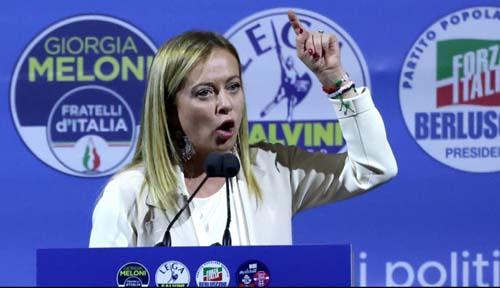
Giorgia Meloni: Italy’s far-right wins election and vows to govern for all
Paul Kirby
Rome: Far-right leader Giorgia Meloni has claimed victory in Italy’s election, and is on course to become the country’s first female prime minister.
Ms Meloni is widely expected to form Italy’s most right-wing government since World War Two. That will alarm much of Europe as Italy is the EU’s third-biggest economy.
However, speaking after the vote, Ms Meloni said her Brothers of Italy party would “govern for everyone” and would not betray people’s trust.
“Italians have sent a clear message in favour of a right-wing government led by Brothers of Italy,” she told reporters in Rome, holding up a sign saying “Thank you Italy”.
She won around 26% of the vote, ahead of her closest rival Enrico Letta from the centre left. Mr Letta told reporters that the far-right victory was a ‘sad day for Italy and Europe’ but his party would provide a “strong and intransigent opposition”.
Ms Meloni’s right-wing alliance – which also includes Matteo Salvini’s far-right League and former PM Silvio Berlusconi’s centre-right Forza Italia – will take control of both the Senate and the Chamber of Deputies, with around 44% of the vote.
Four years ago, Brothers of Italy won little more than 4% of the vote but this time benefited from staying out of the national unity government that collapsed in July.
The party’s dramatic success in the vote disguised the fact that her allies performed poorly, with the League slipping below 9%, and Forza Italia even lower.
Their big advantage, however, was that where they were able to put up one unified candidate in a constituency, their opponents in the left and centre could not agree a common position and stood separately.
Giorgia Meloni appears certain to become Prime Minister but it will be for the president, Sergio Mattarella, to nominate her and that is unlikely to happen before late October.
Although she has worked hard to soften her image, emphasising her support for Ukraine and diluting anti-EU rhetoric, she leads a party rooted in a post-war movement that rose out of dictator Benito Mussolini’s fascists.
